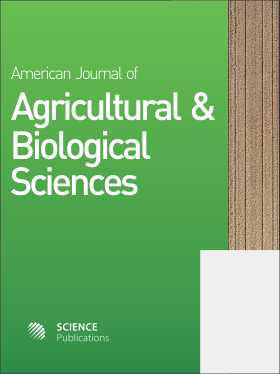Evaluation of the Upland Weed Control Potentiality of Green Tea Waste-Rice Bran Compost and Its Effect on Spinach Growth
- 1 The United Graduate School of Agricultural Sciences, Kagoshima University, Kagoshima 890-0065, Japan
- 2 Field Science Center, Faculty of Agriculture, Saga University, Kuboizumi, Saga 849-0903, Japan
Abstract
This study evaluated the upland weed control potentiality, germination inhibition ability and growth suppression efficiency of the five combinations of green tea waste - rice bran compost (GRC). GRC was prepared by mixing green tea waste and rice bran at five ratios, and allowed to decompose for 5 mo. Application of GRC suppressed weed growth up to 93.4% in number and 95.4% in dry weight in 2004, and 80.7% in number and 73.4% in dry weight of weeds in 2005, as compared with the untreated control (only soil) under the greenhouse condition. Among the five combinations of GRC, rice bran alone (RC) showed the significantly highest and green tea waste alone (GC) showed the lowest weed suppressing activity in both years. The weed control potentiality of GRC was increased by the increase of rice bran percentages in the mixture. The exudates of GRC inhibited the hypocotyl and radicle elongation of lettuce seedlings when examined by the sandwich method. The water extracts of GRC also inhibited the germination and radicle elongation of the test species in the seed germination tests. The growth inhibitory activity of RC was greater than that of GC, and radicle elongation was more sensitive than seed germination and hypocotyl elongation in all bioassays. The inhibitory activity of GRC water extract varied with the test species and was higher for the dicotyledonous species than monocotyledonous species. The inhibitory effect on seed germination and seedling growth increased as the extract concentration increased. The concentration dependent responses of test species to the water extract of GRC indicated that it might contain phytotoxic substances that were responsible for growth inhibition. Moreover, GRC promoted spinach growth significantly compared with the untreated control. These results suggest that the use of 30% green tea waste + 70% rice bran mixture compost (GRC-3) might be useful to control the upland weeds and enhance spinach growth among the five combinations of GRC, and it may reduce the use of hazardous synthetic agrochemicals. Optimization of the combination of composting materials is necessary for the multipurpose use compost.
DOI: https://doi.org/10.3844/ajabssp.2007.142.148

- 6,743 Views
- 5,613 Downloads
- 14 Citations
Download
Keywords
- Compost
- sandwich method
- seed germination test
- selective inhibition
- weeds control
